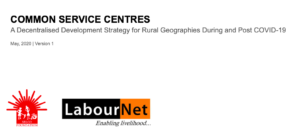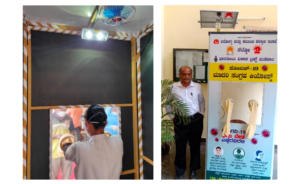The Ferrando Speech and Hearing Centre located in Umniuh, Umsling block, Ri Bhoi, Meghalaya, started a new set up of Ferrando Livelihood cum Vocational Training Centre in 2017, with a strength of 40 people at present with the residential facility. The Training Centre was started with three key objectives- Training, Employment and Sustainability; through which they have reached 14 villages and have also conducted socio-economic surveys. The Centre supports a variety of livelihood activities like agriculture, poultry, piggery, small set up of fishery, dairy, tailoring and production unit, candle making and food processing unit. Within the vocational training centre, students also take part in training – cutting and tailoring, candle making, food processing etc. Grid Electricity is available in the area but due to its unreliable nature, the Centre had not applied for a connection and relied on diesel generators, diesel pumps both of which required 27 litres of diesel each month with an expense of INR 2,000 which had to be procured from a fuel station in Umsing 20 km away.
SELCO Foundation partnered with the organization to empower their mission with appropriate solar energy solutions. The centre runs solar-powered sewing machine, solar-powered milking machines and spinning machines. The centre will soon be expanding its sustainable energy infrastructure for their residential boarding school for children, the vocational training centre and for a chaff cutter for the dairy farm and broom tying unit which will be housed in their vocational training centre.
Solution Overview
Thankfully we have received this opportunity in this dire situation. Otherwise, there were no livelihood options for these women. Due to this, they are at least being able to have some income and support their families.
Sister Marley, Ferrando Livelihood Centre Tweet
Impact
Access to work:
The women working at the centre used to work as agricultural labourers making
marginal incomes. Though they were skilled/semi-skilled tailors there was not much opportunity for them due to lack of linkages or asset ownership. Due to lockdown, their primary livelihood has been adversely affected and this linkage/opportunity provides them with a substantial livelihood alternative.
Energy Sustainability:
The region faces heavy power cuts, and its remote nature would have made access to diesel for generators hard to access and procure. In such a scenario, a decentralised solar energy system offers the Livelihood Centre reliable and adequate power to keep up with production and the demand in the local area- ensuring its overall sustainability.
Financial Model:
An equitable financial model has been put in place where Ferrando centre gets paid INR 10 for each mask by the administration. Out of this, the women are paid INR 7 per mask and the remaining INR 3 is utilised for operational, maintenance costs and also for food and refreshments for the working women.
Local Supply Chain:
Due to the remoteness of the region, the procurement of PPE for local health workers, and other essential workers would have been difficult. Presence of such local tailoring centres, not only provide income opportunities to vulnerable women in the community but have also ensured a local supply of PPE ensuring the safety of the community as a whole.






